
As reported earlier this week, British climbers Nick Bullock and Paul Ramsden made the first ascent of a 1600m, ED+ route up the North Buttress of Nyainqêntanglha's South East Face (7046m) in Tibet, China over seven days. Although both accomplished and highly respected mountaineers, this was the first time that the pair had climbed together.
Their differing backgrounds in climbing - Paul being a highly specialised mountaineer and Nick an all-round wall-rat climber in multiple disciplines - made us wonder how they approached such an expedition together. As Paul is typically associated with regular climbing partner Mick Fowler - with whom he has won the prestigious Piolet d'Or three times - it's fair to say that his partner-to-be had big boots to fill.
Step in Nick Bullock.
'My greatest fear was letting Paul down.'
Despite their success, we're not sure Paul was entirely convinced:
'He failed to make me a cup of tea in the morning, ever!'
We asked Nick some questions about climbing with Paul and on his preparation, with some inside-info from 'The Yorkshireman' himself, Paul Ramsden...
(All in-question quotes taken from Nick's blog 'Death of a Disco Dancer')
Nick
You must have been conscious of the fact that you were effectively 'replacing' Paul Ramsden's established climbing partner, Mick Fowler (who was also busy on Sersank at the same time). You mention you had to be 'interviewed' by Paul for your suitability. How did it feel to be in the spotlight in front of a three-time Piolet d'Or winner?
It's incorrect to say I was a replacement for Mick as such, as Paul and Mick due to age differences and objective differences have moved on, so to speak. Paul wanted to try a technical new route on a 7000m mountain, Mick being 60 years old didn’t, fair enough that, 7000m mountains hurt. I must admit to feeling a tad under pressure teaming up with Paul, he has hardly failed in the last few years, which means a certain type of character. I knew whatever we attempted we would give it a proper go. I also felt under pressure because Paul is a hard working family man who has one trip a year and I didn’t want to let him down. As for the Piolets, I think 21 expeditions qualifies me a little more than a golden axe?
When and how did the South East Face of Nyainqentangla first come onto Paul's radar? You mention Google Earth, but had locals shared much information?
The locals knew very little apart from that we were going to climb on the wrong side of the range, the side we were hoping to climb was too steep and had the possibility of face biting bears on the approach. The bears - I’m glad to say - never materialised, although a visiting yak herder corrected us by showing a picture on his Iphone of what the actual danger was, which turned out to be a lion!
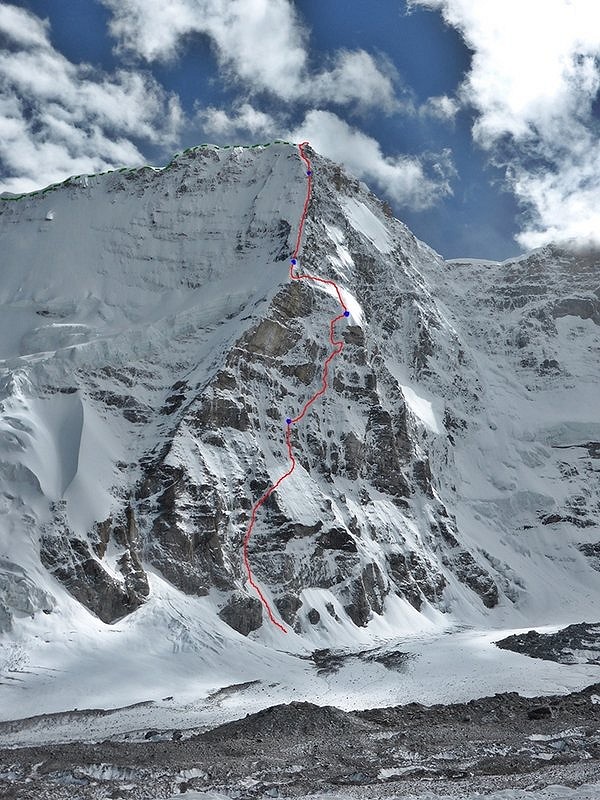
'I think the best thing to bring away from expedition climbing is that it gives me a wider and more universal appreciation of people and their lives; plight and suffering.'
It was your first time in Tibet, which is notoriously difficult to acquire visas and permission for climbing. Did you face much red tape and issues before or during the trip?
Paul sorted it all, I’m glad to say and yes, the red tape and cost is definitely a ramp up from anything else.
Between 1997 and 2012 you'd taken part in 21 expeditions to the Greater Ranges. How did such an intense period of trips affect you physically, and what did you learn/take away from your experiences?
Ha, ha, this question is an essay in the answering. How do I begin? Expeditions, both physically and mentally are very demanding, but hey, no one is forcing you to go away. As I try to take part in all aspects of climbing at a level that challenges me, the expeditions take their toll, it's telling that after a three-year break from expedition climbing the other aspects of my climbing have improved.
I think the best thing to bring away from expedition climbing is that it gives me a wider and more universal appreciation of people and their lives; plight and suffering. It makes me appreciate how easy a life I have and how privileged and lucky I am. Unfortunately, the flip for me on witnessing how hard people’s lives around the world can be is that I often feel a heavy burden of guilt. Not enough to stop me climbing though, so maybe I’m just all talk, but maybe there are many more rich and powerful people in a better position to help who still choose not to?
Your last big trip was in Canada/US earlier this year. How did you prepare in the run up to Tibet? I hear you were berated for being an indoor climber...?
It’s funny how much self-perceived pressure my life choice brings. I get asked several times a day every day of the week where I’m climbing, what I’m climbing, who I’m climbing with, where I’m travelling to next. I don’t mind this, people are just interested, but the constant drip after a while makes a person such as myself begin to question myself if I’m not out there planning and doing stuff on a daily basis. Just because I am more free with my time than most does not mean I can be out climbing 24/7, especially as I’m now getting a tad creaky, so I prefer now to aim at selected quality climbs and give them my total focus. I spent the summer rock climbing on the good days and aerobic training on the shaky days, which definitely helped in preparation for Tibet.
'The pressure I felt in becoming involved with Paul was like never before.' You mention in your blog that Paul's one trip of the year consumed his thoughts for the entire 12 months beforehand and that he claimed 'Full-time climbers never appear psyched' - referring to you. What were you most worried about, and were you thankful for Paul's different, long-term approach in the end?
My greatest fear was letting Paul down, if - given the time I had to prepare - I still let Paul down due to a lack of fitness, I would have needed a kick up the arse. Paul is like many of the people I climb with and if it wasn’t for their dedication, insight, study, intensity, skill and motivation, I would not climb anything as I don’t do study and fact finding, I don’t even look at route descriptions, it bores me if I’m honest, I prefer to read Cormac McCarthy. In my defence, once you get me to the base of a route, there is generally going to be a dedicated effort to get to the top.
How had you typically approached similar expeditions in the past?
I drank a similar amount of wine beforehand to get used to the headaches.
You had just five days of acclimatisation - isn't that relatively short for a 7046m peak? Did you feel well-prepared before setting off up the route?
Yes, a tad short but I hate acclimatisation, it's boring and when you are as old as me it’s a fine line between being ready and being knackered.
Tell us a bit about Paul's approach to food and gear on the expedition - “I wouldn’t go onto the north face of Tryfan in winter with that rack Paul.” Was food and gear as minimalist and terrifying on the climb as he had made out beforehand?
Funny! We certainly had different approaches to gear and food. We took more days’ food than I would have in the past, although nothing for between the porridge for breakfast and the freeze dried evening meal, not even a drink. This, in my slightly thin frame, was a mistake and I knew it was a mistake, I should have brought some gels and a few bars to keep up energy levels through the day. Paul is a dedicated expedition climber and takes his waist line seriously, so he has slightly larger reserves from which to call! Freeze dried meals are very convenient, but I also knew after about 6500m I would not be able to stomach them, which is exactly what happened - meaning for about the final three days I was hardly eating anything through the day. If I had taken a bit of ‘proper’ food or some gels I could have at least substituted the calories. In the end it worked in my favour as Paul - being strong with reserves - had to go and collect the base camp with the motorbike gang, whilst I just lolled in the valley drinking tea and teaching children the English alphabet!
Gear: the rack in the end was just about big enough, although Paul constantly complained!
'The modern is removing the element of the unknown – adventurers, no such thing anymore, just celebrities!'
The weather was changeable and you had no forecasts to rely on for weather windows. How does this affect your approach to the climb, and how does it make you feel mentally about being so committed once you start up?
Personally the weather thing, or not having a forecast, is something Paul and I agreed on. It is only recently on my expeditions that that the person I have been with has started to acquire weather forecasts (the knock-on of Andy Houseman having a girlfriend as he needs to keep in touch with her via a sat phone!) and in some ways they are detrimental to actually going climbing. It sounds stupid I know, but it's telling that neither Paul nor Mick believe in getting forecasts, but do believe in getting going and once going trying to deal with what they get given. I suppose what it all comes down to is how committed you want to be, choice of line, experience in coping, get out of jail options, mindset to deal with what happens should the weather close in and the choices you make once the shit hits the fan. Given the most recent and tragic deaths on the Ogre II of Kyle Dempster and Scott Adamson, this might sound glib, it isn’t, in the big hills, even with a forecast the weather turns; forecasts are not reliable in the mountains and sometimes the greatest price can be paid. Going Alpine style in the Greater Ranges is a dangerous thing, this should never be forgotten and at times the mountains hold nothing back.
Like Paul, I don’t think during the time we were on the actual climb we were in too much of a problem should the weather have closed in, we had enough food and a tent to sit and wait in and we could have abseiled the line. For me the most committing time was when we left the summit and began to traverse the East ridge. The East ridge was a rather long and convoluted ridge to follow and when we were shut down due to white-out and snow, the chances of having a really hard time for continuing were obvious. In the end the weather perked up and after a night we managed to get off, all be it with a reasonable amount of avalanche danger on the loaded slopes.
We had a certain amount of fortune with the conditions given the snow that fell overnight the night we were camping on the ridge. Sometimes no matter how experienced and cautious you are a little luck goes a long way.
You mention that you have turned 50 now and that training is getting a bit harder. Mick Fowler is now 60 and still going strong in the Greater Ranges - see his recent ascent of Sersank - do you think high altitude mountaineering is something you will still be interested in at that age?
Mick is a great inspiration to me, he has done so much and is a true ambassador, but not to want to sound like I’m having a pissing match, Mick has slowed a lot, his choice of route, the technicalities of the climb and the height that Mick now operates at are major factors in what he chooses to climb. His persistent drive is truly aspirational, but age comes to us all, even Mick!
What did you learn from climbing with Paul?
I learnt Yorkshire Tea teabags are the best and if I stay in bed, a mug of such with sugar would usually come my way!
How important are mapping applications like Google Earth becoming in expeditions to remote places - is it something you use frequently? Does it remove some element of adventure?
I never use Google Earth personally, I don’t even use maps, but yes, the modern is removing the element of the unknown – adventurers, no such thing anymore, just celebrities!
What's next for you? Any more big expeditions planned?!
NO!
And finally - what's your best excuse to give to someone asking why you're training indoors on a nice day?!
Skin cancer, it’s a killer!
We also asked Paul a few questions about what Nick was like as a partner:
Paul
What sort of questions do you ask a potential Himalayan expedition partner?
It wasn’t really a job interview, but rather a question of style. There are many ways to climb a Himalayan peak, but I know what works for me and I need a climbing partner who is happy to climb the peak in the same style. I suppose the question is: are you happy to follow my advice and climb it my way? The real job interview occurred when Nick came around to my house and met the wife!
What qualities did Nick have that made you happy to climb with him?
Of course Nick is very technically accomplished, but the the real qualities you need on an expedition are a sense of humour and to be very relaxed about everything. Then when conditions look good, the ability to instantly switch into gear.
You both seemed to have different approaches to preparation, food and gear. How does Nick differ to other partners you've had in the Greater Ranges?
Compared to Mick, Nick's not actually that different really, he’s competent and experienced, although Nick's natural inclination is perhaps to climb lighter and faster, but then he knew that had usually led to failure on previous expeditions. However, given the terrible weather we experienced en route and the fact we made it to the summit, meant that he ended up understanding the way I do things.
How did he fare on the climb, and did he pass the test?! (either as a climbing partner or Yorkshire Tea drinker…)
We got on really well. Never a cross word between us. He did, however, fail to make me a cup of tea in the morning, ever!
***Nick will be chairing the Mountain Equipment Scottish Winter Session at Kendal Mountain Festival 2016 on Saturday 19th November, 4pm-6pm, a unique event featuring Greg Boswell, Guy Robertson, Mick Fowler and Andy Nisbet. Buy tickets here.***
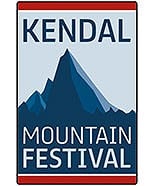
Kendal Mountain Festival 2016

Kendal Mountain Festival is by far the largest and most varied event of its type in the world - it is also the main social event for outdoor enthusiasts in the UK.
'Kendal' is one of the leading festivals of its kind in the world. It is an internationally-known event, attracting film premieres from around the globe. Film makers, TV producers, adventurers, climbers and world-class lecturers gather to take part in four packed days of the very best films, speakers, books and exhibitions covering all aspects of mountain and adventure sports culture. It is also the main social event for outdoor enthusiasts in the UK and 2016 will be our 17th straight year.
- Book tickets on the KENDAL MOUNTAIN FESTIVAL SITE
- Grab a Film Pass here: FILM PASS
Read Nick's blog on the climb.
Read Nick's blog on preparation.
Nick is sponsored by: Boreal, DMM and Mountain Equipment
- INTERVIEW: British Mountaineering Council CEO Paul Ratcliffe reflects on 2024 12 Feb
- INTERVIEW: Team GB Olympian Erin McNeice on her breakout 2024 season 11 Feb
- SKILLS: Push Your Grade: How to Climb Your First 7a Sport Route 6 Nov, 2024
- ARTICLE: Olympic Route Setter Garrett Gregor on Paris 2024 17 Sep, 2024
- ARTICLE: How did the Paris 2024 Olympic Games impact Sport Climbing Athletes' Instagram Followin 4 Sep, 2024
- ARTICLE: Meet the Paris 2024 Olympic Routesetters Part 3: Olga Niemiec, Boulder 4 Aug, 2024
- INTERVIEW: Meet the Paris 2024 Olympic Routesetters Part 2 - Martin Hammerer, Lead 1 Aug, 2024
- ARTICLE: Sport Climbing at Paris 2024: Schedule and How to Watch 30 Jul, 2024
- INTERVIEW: Meet the Paris 2024 Olympic Routesetting Team - Garrett Gregor 29 Jul, 2024
- INTERVIEW: GB Climbing Olympic Coach Rachel Carr on Paris 2024 24 Jul, 2024





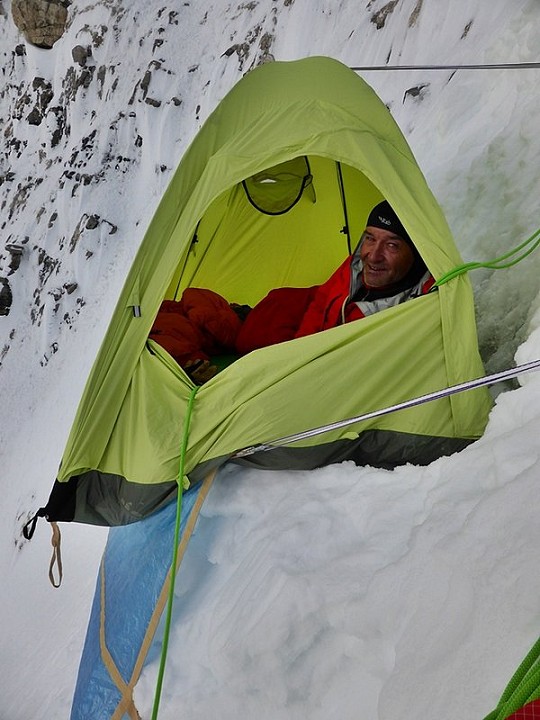





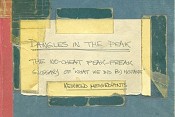
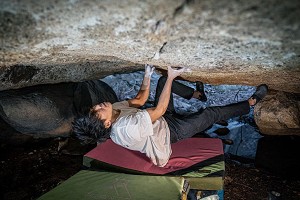
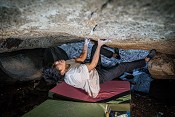






Comments